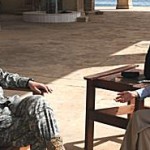Sunday
Apr122009
Israel-Palestine: The Dance Resumes as Abbas Calls Netanyahu
 Sunday, April 12, 2009 at 17:28
Sunday, April 12, 2009 at 17:28 
 So the Palestinian Authority leader and former President of the West Bank, Mahmoud Abbas, has called the current Prime Minister of Israel, Benjamin Netanyahu for a "friendly and warm" conversation. According to the Abbas and Netanyahu offices, the Israeli Prime Minister "intends to resume talks and co-operation to promote peace".
So the Palestinian Authority leader and former President of the West Bank, Mahmoud Abbas, has called the current Prime Minister of Israel, Benjamin Netanyahu for a "friendly and warm" conversation. According to the Abbas and Netanyahu offices, the Israeli Prime Minister "intends to resume talks and co-operation to promote peace".All very polite and very insubstantial, even on a slow news day, except for the timing. Tomorrow US envoy George Mitchell sets off for the Middle East, with Israel his first stop. And, as Enduring America noted earlier this week, there will be other discussions in the region such as a move toward Israel-Syria talks.
For all this to look good in public, and thus offer any private hope of advance, Netanyahu has to offer a welcome. He does not have to commit to a "two-state solution", but he does have to distance himself from outspoken Avigdor Lieberman, who has tried to pour cold water on the idea of any negotiations.
So this was a PR phone call, with follow-up press releases. That doesn't mean it is void of significance: those who are sceptical of Abbas, especially after his possible complicity in Israel's Gaza War, will accuse him of fitting in Netanyahu's pocket. Others in the Palestinian Authority, notably Saeb Erekat, will press the demand for recognition of two states.
Take your seats, folks. The dancing and diplomatic juggling --- I won't say "three-ring circus" --- is about to begin.

 On Friday,
On Friday, 
